Following days of single-digit temperatures, a burst pipe flooded six Graduate Center C suites during winter break, said Richard Bova, senior associate dean of residential life and dining services. After a window was left open, Bova said, a radiator pipe in suite 620 froze and burst Jan. 6, flooding the surrounding suite and those below it.
The leak affected 22 student rooms and a few common areas, said Deborah Dunphy, director of facilities services. After temperatures rose, the University discovered the flooding and immediately began drying the carpets and removing affected students’ belongings, Dunphy said.
Students’ clothing and other belongings were professionally dry-cleaned, Bova said, adding that students could file insurance claims with the University for any items damaged irreparably.
The University assessed the air quality in the dormitory, humidified affected areas and repainted damaged walls, Bova said. Students will not have to relocate as a result of the flooding, he added.
The flood had no adverse environmental effects, Bova said, and “everything was repaired and monitored correctly prior to students’ return.” The process has cost the University around $4,200, excluding insurance claims.
The Office of Residential Life remained in contact with affected students throughout the process, Bova added.
Alexandria Sheng ’15, who lives in suite 320, said she received a number of emails from the University and upon her return was visited by Melissa Meo, assistant director of insurance and purchasing services.
“I think they’ve been pretty responsible about the whole thing,” Sheng said. “It was actually super nice that they dry cleaned everything.”
Skylar Fox ’15 said the University ensured his room in suite 620 was prepared for his early arrival to campus, including cleaning out anything that would activate his mold allergy. The leak mostly affected his room’s floor and nothing was damaged beyond repair, he said.
“It definitely played out the best possible way,” he said.
But other affected students said sentimental items, books, wall decorations and rugs were irreparably damaged.
A few also said communication from the University could have been better.
“In a perfect world, we would have had more say as to where our damaged belongings went,” said Grace Miller ’15.5.
The University “didn’t give a lot of detailed information” when notifying students of the flood, Miller said, though she added that she understands providing such information would have been difficult given the number of affected rooms.
Stephanie Randall ’15 said she was planning to move from Chapin House to suite 620 in Grad Center C this semester when a friend notified her about the flooding. “It was curious that I didn’t get a notification,” she said.
After emailing and calling Residential Life, Randall learned her suite was inhabitable, she said, adding that her Grad Center room was indeed clean when she returned.
A hot water riser also burst in Minden Hall during the break, though it did not affect student rooms, Bova said.
An open window in the seventh-floor bathroom caused the pipe to freeze, flooding the bathrooms and a few hallways below the burst pipe, Dunphy said.
“It’s totally avoidable if people follow the rules and pay attention,” Bova said about the burst pipes.
He said the University currently inspects dorm rooms following students’ departure for the winter holidays, but some rooms are not inspected if students leave late in the semester.
“We are going to have to think about doing a second round or at least an outside visual inspection to ensure that students have done what we’ve asked them to do,” he said. “We will continue to keep thinking of creative ways to check on what students are doing without trying to be too intrusive on their lives, especially during a period like finals.”

ADVERTISEMENT




